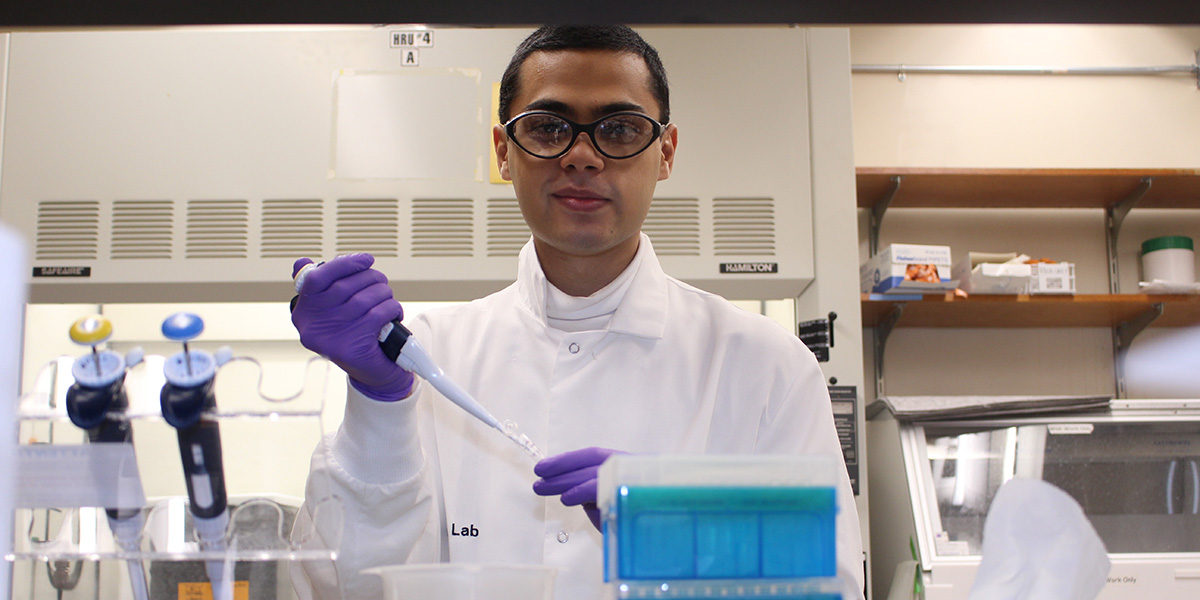Written by Abdullah Salim (2022)
Major: Biochemistry
As someone who has long had an interest in the natural sciences, specifically the field of biology, I knew early on that I wanted to do something science related in college. I had considered undergraduate research, but like many of my peers, I initially did not pursue the idea because I thought that most professors would either be fully staffed or too busy to respond. Yet, with the encouragement, advice, and support of two professors, Dr. Richard Bennett and Dr. Joe Bailey, I decided to take action and apply to my lab of choice. Now, as a first-semester freshman, I participate in undergraduate research as a part of the Hazen Lab.

I chose the Hazen Lab for a variety of reasons. First, I found that the lab’s focus on microbiology, microbial ecology, and environmental engineering aligned perfectly with my personal and academic interests. Secondly, as a lab that conducts research on a diverse spectrum of projects, from the molecular to the ecosystem level, I knew that the Hazen Lab would provide me with a wide array of resources and the ability to conduct research on a number of issues. Finally, Dr. Terry Hazen, who runs the lab, is a highly renowned scientist and a prolific researcher. The chance to work under his direction was an amazing opportunity I didn’t want to pass up.

Despite conducting research for only four months, I have gained invaluable knowledge and experience by working in the lab. Working with my mentor, doctoral student Saad Abd Ar Rafie, I have focused on looking at the effect of wildfires on soil microbial communities. By comparing pre- and post-controlled burn soil samples, we attempt to discover how microbes in select ecosystems might be affected by fires. I have performed countless DNA soil extractions, learned a number of methods and techniques for analyzing the quality and quantity of DNA sample yields, and in the process, learned to use a number of sophisticated and advanced lab tools and machines. As a first-year student, this opportunity to develop my skills and understanding of the lab environment is unparalleled.
Whether it’s something as simple as doing chores around the lab or something more complex like conducting DNA extractions, every day in the lab has been a rewarding learning experience. At the most basic level, research has taught me how to work collaboratively within a group to achieve a goal. It also taught me the importance of attending to my work with precision and giving it utmost care it deserves. To avoid errors, I had to make sure that to follow procedures correctly at all times. Most importantly, research has allowed me to be on the forefront of breaking research. In the process, I’ve had the opportunity to learn concepts, content, and techniques beyond that of what my peers have had the chance to learn in their undergraduate classes.

I’ve found that the skills gained through research are readily transferable to any field of work. Undergraduate research helps students develop qualities central to the identity of a 1794 Scholar. Seeking out involvement, engaging academically, and being open to new ways of thinking are essential parts of the 1794 experience. Students coming out of an undergraduate research experience have also developed skills that make them good team players, conscientious workers, and life-long learners. That is why many graduate schools and employers across a spectrum of fields seek and give priority to candidates that have conducted undergraduate research. From personal experience, I can say that research is an excellent way to make the most out of your college experience while simultaneously challenging and pushing yourself as an honors student.
So, I would challenge all honors students to consider participating in an undergraduate research opportunity. Be proactive – go on your college’s faculty page, look at the different faculty profiles, and read about the research they are doing. When you find a research profile that draws your interest, send that professor a message introducing yourself and expressing your interest. Include a resume and kindly ask one of your professors to send in a referral for you. You’ll get to meet incredible people, gain essential experience in your field, and have the opportunity to contribute to something that is greater than yourself.
